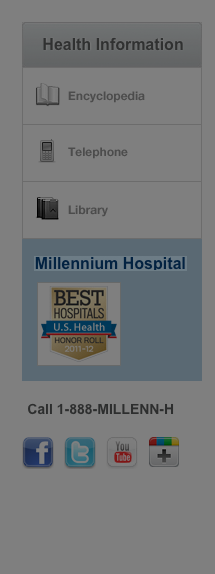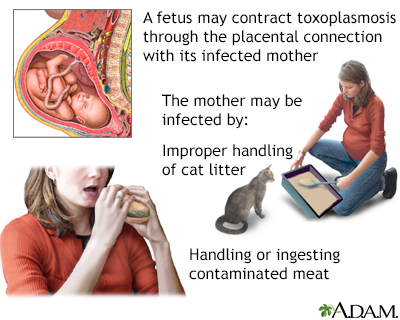Toxoplasmosis
 Print-Friendly
Print-Friendly
Toxoplasmosis is an infection due to the parasite Toxoplasma gondii.
Toxoplasmosis is found in humans worldwide and in many kinds of animals and birds. The parasite also lives in cats.
Human infection may result from:
- Blood transfusions or solid organ transplants
- Handling cat litter
- Eating contaminated soil
- Eating raw or undercooked meat (lamb, pork, and beef)
Toxoplasmosis also affects people who have weakened immune systems. These people are more likely to have symptoms.
The infection may also be passed from an infected mother to her baby through the placenta. This results in congenital toxoplasmosis.
I Would Like to Learn About:
Causes
Toxoplasmosis is found in humans worldwide and in many kinds of animals and birds. The parasite also lives in cats.
Human infection may result from:
- Blood transfusions or solid organ transplants
- Handling cat litter
- Eating contaminated soil
- Eating raw or undercooked meat (lamb, pork, and beef)
Toxoplasmosis also affects people who have weakened immune systems. These people are more likely to have symptoms.
The infection may also be passed from an infected mother to her baby through the placenta. This results in congenital toxoplasmosis.
Symptoms
There may be no symptoms. If there are symptoms, they usually occur about 1 to 2 weeks after contact with the parasite. The disease can affect the brain, lung, heart, eyes, or liver.
Symptoms in people with otherwise healthy immune systems can include:
- Enlarged lymph nodes in the head and neck
- Headache
- Fever
- Mild illness similar to mononucleosis
- Muscle pain
- Sore throat
- Visual disturbances
Symptoms in people with a weakened immune system can include:
Exams and Tests
Your health care provider will perform a physical exam. Tests that may be done include:
Treatment
People without symptoms usually do not need treatment.
Medicines to treat the infection include a specific antimalarial medicine and antibiotics. People with AIDS should continue treatment for as long as their immune system is weak, to prevent the disease from reactivating.
Outlook (Prognosis)
With treatment, people with a healthy immune system usually recover well.
Possible Complications
The disease may return.
In people with a weakened immune system, the infection may spread throughout the body, leading to death.
When to Contact a Medical Professional
Contact your provider for an appointment if you develop symptoms of toxoplasmosis. Medical care is needed right away if symptoms occur in:
- Infants or babies
- Someone with a weakened immune system due to certain medicines or disease
Also seek medical treatment right away if the following symptoms occur:
- Confusion
- Seizures
Prevention
Tips for preventing this condition:
- Do not eat undercooked meat.
- Wash hands after handling raw meat.
- Keep children's play areas free from cat and dog feces.
- Wash your hands thoroughly after touching soil that may be contaminated with animal feces.
Pregnant women and those with weakened immune systems should take the following precautions:
- Do not clean cat litter boxes.
- Do not touch anything that may contain cat feces.
- Do not touch anything that could be contaminated by insects, such as cockroaches and flies that may be exposed to cat feces.
Pregnant women and those with HIV/AIDS should be screened for toxoplasmosis. A blood test can be done.
In some cases, medicine to prevent toxoplasmosis may be given.
Related Information
| Central nervous sy...Immunodeficiency d... |
References
Mcleod R, Boyer KM. Toxoplasmosis (Toxoplasma gondii). In: Kliegman RM, St. Geme JW, Blum NJ, et al, eds. Nelson Textbook of Pediatrics. 22nd ed. Philadelphia, PA: Elsevier; 2025:chap 336.
Montoya JG, Boothroyd JC, Kovacs JA. Toxoplasma gondii. In: Bennett JE, Dolin R, Blaser MJ, eds. Mandell, Douglas, and Bennett's Principles and Practice of Infectious Diseases. 9th ed. Philadelphia, PA: Elsevier; 2020:chap 278.











